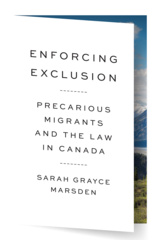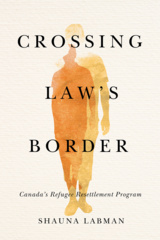
Governing Irregular Migration
Bordering Culture, Labour, and Security in Spain
This thorough analysis of immigration governance in Spain explores the dynamics of inclusion and exclusion at play at one of Europe’s southern borders. David Moffette analyzes Spain’s processes of immigration governance and reveals the complicated series of legal obstacles facing many migrants.
Differential access to border mobility is a central concern of contemporary politics, and nowhere is this more apparent than in the European Union, where external borders have been strengthened to prevent irregular entry and internal borders have been removed to promote free circulation. Since 2000, Spain has seen the arrival of thousands of migrants, many of whom face precarious immigration status. Moffette draws on interviews with policymakers and on more than three decades of parliamentary debates, laws, and policy documents to analyze Spain’s policies. He shows that culture, labour, and security issues intersect to create a regime of migration governance that is at once progressive and repressive, characterized by programs of mass regularization of migrants living in the country without authorization, but restrictive immigration policies and tight border control.
A detailed empirical analysis of Spanish immigration policy, this book provides a thought-provoking and insightful contribution to debates in socio-legal, border, and citizenship studies.
This book will be of interest to scholars in socio-legal studies, sociology of law, and sociology, as well as those with an interest in migration, race, policing, and border security.
This book is an intellectual tour de force that will become a must-read for critical border and migration scholars. Moffette combines ethnography, archival research, and interviews with officials to analyze the multi-actor and multiscalar governing of irregular migration in Spain. His analysis vividly captures how irregular migrants are not only criminalized but also selectively and contingently incorporated through complex logics and bordering practices that occur in various sites and timelines.
David Moffette has written a compelling analysis of the processes aimed at governing migration and human mobility. His book’s salience and academic impact go far beyond the geographical scope of his study. Governing Irregular Migration makes a crucial contribution to the socio-legal analyses of migration governance and to related criminological, sociological, and legal debates.
Governing Irregular Migration makes an exciting and original contribution to how we conceptualize, and contend with, the messiness of migration governance in a global, multiscalar world. The book puts socio-legal studies and migration research into elegant conversation using the concepts of probation, discretion, and borderwork to show how Spain turned irregular migration into a policy problem in need of management.
Scholars of migration and border governance have not always appreciated the significance of the Spanish case. Exceptional in its empirical acuity, conceptual richness, and political insight, Governing Irregular Migration corrects this oversight. It does not just add one more case to the debate; it shows convincingly that migration governance looks quite different when viewed through a Spanish lens.
1 Studying the Governing of Irregular Migration
2 Early Problematizations: “Immigrants,” “Foreign Workers,” and “Illegals”
3 Culture: Race, Religion, and the National Imaginary
4 Labour: Flows, Workers, and the Labour Market
5 Security: Threats, Crime, and State Sovereignty
6 Multiscalar Governance: Borderwork, Desirability, and Deportability
7 Governing Immigration through Probation
Notes; References; Index













